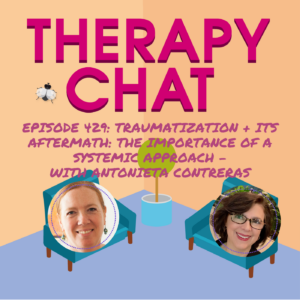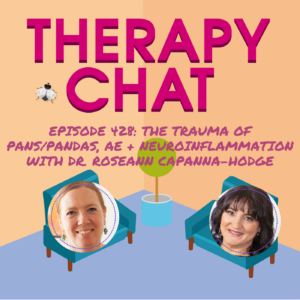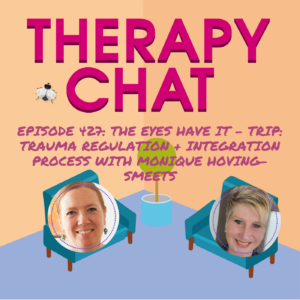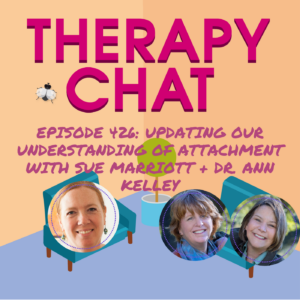Therapy Chat Episode 132
Welcome to this special Sexual Assault Awareness Month Episode! I’m sharing two episodes from early in Therapy Chat’s life on the issue of sexual assault. After the #MeToo movement, founded by Tarana Burke, ignited on social media over the past year, the general public began to understand what most women and many men already knew: sexual violence can affect anyone, and its effects are deep and longlasting. This is a problem in our culture which can be ended, but not without everyone gaining awareness. Statistics indicate that one in four women and one in six men will be sexually assaulted during their lifetime. April is Sexual Assault Awareness Month, a great time to learn more about this important issue. Here’s an article from the New York Times about why Tarana Burke started this movement: https://www.nytimes.com/2017/10/20/us/me-too-movement-tarana-burke.html
What you’ll hear in this episode:
- Two types of sexual assault are Childhood Sexual Abuse (to be covered in a later episode) and Sexual Assault/Rape not involving a child. This is our focus today.
- If you are assaulted, you have several options to consider:
- Call a Sexual Assault Crisis Hotline. Visit the Rape, Abuse, and Incest National Network at www.rainn.org.
- Most hospitals provide a forensic evidence exam at no cost to you, within 120 hours of the assault. Your state’s sexual assault coalition can give you a list of hospitals with forensic programs.
- It is your personal decision whether or not to report the assault to the police and you can usually receive an evidence collection exam without reporting to police.
- The victim should tell someone who will be supportive. Visit www.evawintl.org (End Violence Against Women International.) Check out their “Start by Believing” campaign.
- The US military and most colleges/universities have separate options for reporting sexual assault.
- Keep in mind that the civil legal process is another option outside the criminal investigation; a settlement can be obtained without bringing criminal charges.
- The Maryland Coalition Against Sexual Abuse (MCASA) is an outstanding resource for survivors. http://www.mcasa.org/
- Find a Sexual Assault Crisis Center Directory at www.centers.rainn.org.
- There are some common reactions of victims following sexual abuse. Find a comprehensive list at www.musc.edu.
- There are many community events across the country in April to bring awareness to sexual assault. Some events include The Clothesline Project, The Monument Quilt, Performances of The Vagina Monologues (find info at: www.vday.org), Take Back the Night, and Walk a Mile in Her Shoes.
This is Part 2 of a series about Sexual Assault Awareness, and today’s focus is on Childhood Sexual Abuse. Let’s jump right into our topic!
What you’ll hear in this episode:
- Childhood Sexual Abuse is “a form of child abuse including sexual activity with a minor who is not capable of consenting.” Remember that a child CANNOT give consent to sexual activity!
- Childhood Sexual Abuse is not always physical contact, but can include digital/online interaction, fondling, exhibitionism, child pornography, sex trafficking, and much more.
- In 93% of cases, the sexual abuser of a child is someone known to the child or the family.
- Most statistics under-represent the frequency of occurrence, but data indicates 1 in 5 girls and 1 in 20 boys will be sexually abused during childhood.
- Up to 20% of adult females and 5-10% of adult males have been sexually abused during childhood.
- There is an increased risk of sexual assault later in life when a child has had their boundaries violated in this way.
- Most offenders are male, with about 33% being juveniles.
- There is often a “grooming process” used by the abuser to draw the child into a sexual relationship, and usually, the abuser will fill roles of trust and value in the victim’s family. This makes it harder for children to come forward and makes them more likely to believe they are responsible for the abuse
- The effects of childhood sexual abuse can include emotional problems, mental health issues, behavioral problems, and academic problems.
- The effects can also include PTSD, depression, anxiety, suicide, and eating disorders.
- Many times these behaviors are not recognized as signs of sexual abuse.
- Protect children by showing interest in their lives, knowing the people in their lives, and knowing caregivers especially well.
- Background checks and the sex offender registry are NOT foolproof.
- Know how to ask questions to the child and how to respond without judgment and blame.
- Report abuse to the police and, if applicable, to Child Protective Services.
- Call the Child Help National Abuse Hotline: 1-800-422-4453
- Help is available at sexual abuse crisis centers. Visit centers.rainn.org and search by zip code.
- When seeking a therapist look for one with specific training in the field of sexual abuse. Not all therapists are qualified to help in all areas. The therapist should have knowledge and experience in developmental trauma.
- Other resources include: victimsofcrime.org and www.rainn.org.
- Call the National Sexual Assault Hotline 24/7 to speak to someone who can help you if you need someone to talk to after listening to this episode. The phone number (US Only) is: 1-800-656-4673
The RAINN chat hotline is available at: https://hotline.rainn.org/online/terms-of-service.jsp




